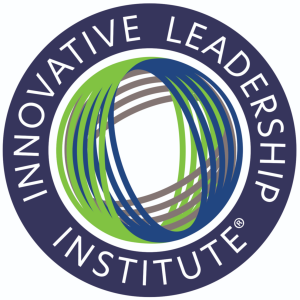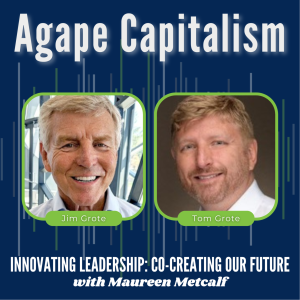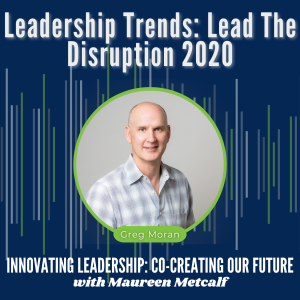Episodes

Monday Mar 06, 2023
Monday Mar 06, 2023
Guest: Terri O'Fallon & Kim Barta
Ethics, which is a fundamental aspect of all spiritual paths, includes the elements of emotional, social, behavioral, intellectual, and moral intelligence. Terri O'Fallon and Kim Barta, join Maureen to discuss their view that any path that leads to growth in these aspects are spiritual. This perspective allows us to see how each of these areas grow and develop and mature leaders and help them support social structures that hold organizational integrity.

Monday Mar 06, 2023
Monday Mar 06, 2023
Guest: Mike Morrow-Fox
In order to exhibit all the great leadership behaviors that have been learned from reading great books, attending inspiring conferences and listening to innovating podcasts, leaders must have a leadership maturity that will facilitate the alignment of their aspirations with their behaviors. Mike Morrow-Fox joins Maureen to discuss leadership maturity, what we know about it and how leaders can evolve their leadership maturity.

Monday Mar 06, 2023
Monday Mar 06, 2023
Guest: Alexia Maas
With great power comes great responsibility. Our spiritual evolution and collective wisdom struggle to keep pace with the power granted by our technological evolution. Harnessing the good business does by scaling science for the benefit of humanity, through creating communities where people can learn—and contribute more than they could alone—and by furthering human flourishing are among noblest aims we may pursue. The future toward which business is leading us, in 2030, is the backdrop to our change. We have in our hands, as citizens and as business leaders, the power to do great good by pointing business toward our most inspirational and useful aims and leading those changes with passion and reason. Alexia Maas joins Maureen to discuss the disruptions occurring and the legal impacts those disruptions are making.

Monday Mar 06, 2023
Monday Mar 06, 2023
Guest: Jim Grote & Tom Grote
In today’s environment where the news headlines are dominated by stories designed to draw attention (often negative attention), there is a hope that change can happen when individuals and businesses choose to conduct themselves in a way that is counter-cultural. Jim and Tom Grote join the show to discuss their business model of Agape Capitalism, which is a way of doing business based on the power of love. They want to extend this impact beyond their company or their industry to the entire economy.

Monday Mar 06, 2023
Monday Mar 06, 2023
Guest: Greg Moran
During a time of ongoing organizational disruption, leaders benefit from exploring how the rapid change can serve as a pointer and inspiration to help them envision futures that were not possible as recently as last year. Each disruption opens another door to opportunity across a broad range of industries. Greg Moran joins Maureen for this annual trend discussion that looks at what we think are the most important business drivers to consider over the next three to five years.
Leadership Trends: Lead The Disruption 2020
The following blog is a republish of an article appearing in Forbes written by Maureen Metcalf. It is a companion to the Trends podcast titled Leadership Trends: Lead the Disruption 2020.
To learn more about the 2020 Trends, click here.
During a time of ongoing organizational disruption, I encourage leaders to explore how rapid change can serve as a pointer and inspiration to help them envision futures that were not possible as recently as last year. Each disruption opens another door to opportunity across a broad range of industries.
This annual trend summary looks at what I think are the most important business drivers to consider over the next three to five years.
Disruption is accelerating. Organizations must continue to monitor trends and disruptions and look for ways to leverage them for strategic advantage. It's often noted that businesses must recognize the importance of disrupting or get disrupted. The question for organizations and their leaders is how to monitor these trends and create an advantage.
One essential tool is the strategic planning process. This process itself looks different now than it did in the past. It provides a necessary structure for leaders to use as they consider current and potential disruptions. The planning process allows leaders to envision the future and develop a business strategy to turn disruption into business advantage.
Adaptive leadership is required. As companies evolve to respond to disruption, leaders need to elevate the quality of their leadership. The challenges businesses face are adaptive: leaders need to change themselves and their organizations. We are facing problems that we can’t solve with our current thinking. Dr. Ron Heifetz, Harvard, talks about adaptive leadership as a practical leadership framework that helps individuals and organizations adapt to changing environments so they can effectively respond to recurring problems. This research has been considered in the 10 Must-Reads by the Harvard Business Review. I recommend leaders elevate the quality of their leadership rather than build skills.
Organizations need to innovate who they are — and what they offer. Organizations need to build innovation into their DNA. This means they need to get comfortable updating what they do and how they do it to meet evolving strategic goals. In addition to elevating their leadership, leaders must update the overall systems, processes and cultural beliefs that underpin their organizations.
According to Bloomberg (paywall), “Leaders at some of the world’s largest companies said they plan to abandon the long-held view that shareholders’ interests should come first amid growing public discontent over income inequality and the burgeoning cost of health care and higher education.”
This level of change could mean a significant overhaul of how companies operate. Innovation must be a priority to transform organizations. Effective innovation requires creating clear accountability, assigning people, measuring results and allocating financial resources.
Attracting and retaining the right people will become increasingly difficult with changing job requirements and growing skill gaps. According to IBM Institute for Business Value's Enterprise Guide to Closing the Skills Gap: “Arguably, one of the greatest threats facing organizations today is the talent shortage. Executives recognize the skills gap. They know it’s both real and problematic. But most of their organizations don’t appear to be actively or effectively tackling the issue.”
It goes on to say, “Compounding the issue, new skills requirements continue to emerge, while other skills are becoming obsolete. And it’s all happening quite rapidly.” Organizations must elevate their focus on the impact disruption will have on their workforce. This includes focusing on topics like creating real diversity and inclusion. We can no longer ignore or give minimal effort to the levers that are proven to drive success.
Digital transformation drives and destroys value. Organizations must become more effective at leveraging digital tools. The lines between the physical, digital and biological worlds are becoming more blurred. Many organizations are now using some form of robotic process automation (RPA), business analytics or artificial intelligence.
Digital transformation is the integration of digital technology into all aspects of a business. It is a trillion-dollar industry, but 70% of all digital transformations fail. The most successful organizations will break the code on implementing these tools effectively and efficiently.
Human resilience remains critical. As organizations accelerate the pace of change, people are often overloaded with current work and transformation work. The people who make change possible hit a point of diminishing performance that impacts their ability to deliver. Employers must provide work environments that maximize employee performance.
One important factor is creating an environment that ensures employees connect the work they do to their values. Even better, when possible, create opportunities for employees who don’t routinely interact with clients/customers to interact and see their impact. Employees also need to own their personal resilience. They can build resilience by ensuring they are taking care of their physical health, engaging in a mindfulness practice that allows them to observe and manage their thinking and building healthy connections inside and outside of work.
Sustainability and the human/planet interface are critical. We continue to see an acceleration in climate volatility, high costs to businesses from weather events, lost biodiversity and environmental damage. According to the Associated Press, July 2019 was the hottest month in recorded history. Many parts of South America are burning in unprecedented forest fires. Glacial melt is accelerating, “Over 30 years, suddenly almost all regions started losing mass at the same time,” said researcher Michael Zemp of the University of Zurich. “That’s climate change if you look at the global picture.”
Addressing this trend will require everyone to act. In 2015, the UN created the Sustainable Development Goals, "the blueprint to achieve a better and more sustainable future for all." They address global challenges, including those related to poverty, inequality, climate, environmental degradation, prosperity and peace and justice. The goals interconnect and are designed to leave no one behind. These goals were signed by 193 countries.
Many organizations are making progress. The World Green Building Council supports efforts to convert buildings to energy-efficient standards on a large scale. We see changes like the move toward more local foods across the U.S. and expanding solar power in Nigeria. These actions are a start. As we envision the future, we can elevate the quality of our organization's leaders.
To learn more about the 2020 Trends, click here.
About the Author
Maureen Metcalf, CEO of the Innovative Leadership Institute, is a renowned executive advisor, coach, consultant, author and speaker.

Monday Mar 06, 2023
Monday Mar 06, 2023
Guest: Kim Campbell
As our world is changing at a rapid pace and our leadership strategies are changing, what does this mean for women in leadership? In this program, we will be discussing the changes of women in leadership with an experienced leader who has had significant worldwide leadership roles. Right Honourable Kim Campbell will share her insights from women in leadership from the early 1990s to now and where women in leadership hope to go in the future.

Monday Mar 06, 2023
Monday Mar 06, 2023
Guest: Daniele Henkel
We are living in a world where we are barraged with people who take the quick path and, in many cases, ethical short cuts to achieve success. These short cuts are often exposed, and many people have a crisis of faith in our institutions. This crisis can create a crisis of faith in our institutions. With this crisis as the backdrop, Maureen will discuss character with Daniele, who promotes being a leader who lives the highest ethics put into action! Daniele will tell us about her journey as a highly principled leader. Part of her conversation will explore how we got where we are and more importantly, how can we move forward. People are trying to find the solutions. Many of us know the answer – it is grounded in respect for one another, exploring respectful discourse, returning to basic values of respect, honor, loyalty. This requires each individual leader to be clear and personally responsible for your words and actions. What you do matters, and it impacts others.

Monday Mar 06, 2023
Monday Mar 06, 2023
Guest: Christoph Hinske
Systems Innovation, including systems thinking & dynamics, is one of the most essential skill sets in the 21st century. Christoph Hinske joins Maureen to discuss how the basics can be learned in under 10 minutes and applied to your own projects in under 4 hours. Do not believe in people who state: "You have to have a high IQ, use expensive programs and study for years to use systems stuff. Without this, you will never be able to lead in, sensitive, messy and highly ambiguous environments."

Monday Mar 06, 2023
Monday Mar 06, 2023
Guest: Melissa Lamson
Successful organizations of the future are the ones that will manage the decentralized human capital and diverse human culture inherent in any global business environment. Melissa Lamson joins Maureen to discuss how new technology has become the primary driver of our global communication and successful managers know how to use technology to manage and motivate teams remotely. But it also requires a whole new set of communication and project management skills that are constantly evolving.
5 Tips for Effective Leadership During a Crisis
This blog is provided by Lisa Michaels as a companion to the podcast with Melissa Lamson, Managing Effectively in a Complex Global Business Environment.
When a crisis hits, some companies survive and thrive afterward, while some perish. Often, what distinguishes these two is good leadership.
As a leader, your role is critical during a crisis. Everyone will look to you to help them make sense of the situation and lead the way out.
Below are some critical steps you should take to reduce the impact of the crisis and emerge stronger.
#1 Communicate with Transparency and Immediacy
Once an incident happens, be quick to communicate and provide much-needed details. Be transparent, no matter how dire the situation is. Transparency allows you to reestablish trust, while immediacy ensures people hear the unbiased news from you, not from others.
This type of communication is important for both your employees and people outside your organization. You will need to repeatedly keep people informed about developments.
Communicating the bad news early to employees is important as people need to be aware of the gravity of the situation to act accordingly.
A good example of effective crisis communication is when one Virgin Group spacecraft crashed, leading to the death of one pilot and the injury of another. The founder and head of the company, Richard Branson, quickly went to the scene of the incident and posted ample updates.
The company showed true concern for the pilots’ families. They then continued to work towards successfully achieving its mission in honor of the pilot’s life. These steps prevented reputational damage to the company.
#2 Lead by Example
You will be the one who sets the tone during a crisis. Your employees will often respond in the same way as you do. If you respond calmly and responsibly, your employees will follow suit. If you live in denial, then others will not likely feel any sense of urgency.
A study conducted by the University of Georgia found that self-discipline, or lack thereof, is contagious. If you find that someone on your team is panicking, it is better to talk to them privately and ask them to stay away from others until they can contain themselves.
It is also essential to maintain a hopeful attitude and not show despair in front of your team. Your team morale is your responsibility, and your behavior has a significant impact on it.
#3 Provide Support to Employees
Crises are said to hit organizations, but in fact, they hit people. As a leader, you need to genuinely empathize with your employees and mitigate the damage.
One German company showed wisdom in its approach to cutting costs in the face of the global financial crisis in 2008 without hurting the wellbeing of its employees.
The company offered its employees to work half time or less based on the actual demand for their services, instead of being laid off. The employees took it well and trusted the management team more.
Once the economy recovered, the company rehired the employees on a full-time basis. The lesson is that you should think about the well-being of people, and people will take care of your company.
Moreover, good leaders show responsibility and concern even if the crisis is not their fault.
An example is Johnson and Johnson’s response to the death of seven people who consumed Tylenol. The company knew Tylenol was not the cause, but it chose to recall the capsules, communicate actively, and establish a hotline to answer queries from worried consumers.
While the recall cost the company a lot of money, it kept the company in good standing. As a leader, you should act responsibly and do what is good for the majority of people involved. It will reflect well on your organization.
#4 Think Ahead to Maintain Operations During the Crisis
A crisis subjects your company to a harsh test. When this happens, people wonder whether the company will still exist after the crisis is over. This is why it’s important to conduct a business continuity planning exercise in advance.
The scope of business continuity planning includes steps to improve business resiliency in case a potential threat is materialized to ensure that operations continue during a crisis.
This involves all major systems which should continue to run in case of a major disruption. In today’s environment, the most vital system in most organizations is the IT system. Therefore, response plans for disruptions to the IT system should be established, and you should be able to migrate your databases if needed.
A good business plan usually includes a disaster recovery plan, but the two should not be confused. A continuity plan ensures that operations continue (or endure), whereas a recovery plan is a plan to come back from a major disaster, such as recovering a large dataset after it is lost.
The high failure rates of business following disasters, such as a fire or major hacking, show that both plans are critical for the organization's resilience. Proper execution of those plans ensures that companies survive and people maintain their jobs.
#5 Develop Other Leaders
Good leaders empower other people to become leaders themselves, rather than gather followers around them. Good leaders request honest feedback and hear criticism. They are humble and realize that they are imperfect and can benefit from people’s views and opinions.
Moreover, true leaders democratize their organizations. They make others feel valued and empower them to become leaders themselves.
Unfortunately, those qualities are rare, but you can stand out as a leader and build a flatter and more resilient organization.
Final Thoughts
Crises are there to test what you are made of as a leader. You need to rise to the occasion, come up with solutions quickly, and lead your team through implementing them while staying compassionate.
You will also need to pay attention to people’s morale. You can be honest with your employees about the situation, while still offering hope at the same time.
It is often this honesty and hope that will empower the team to endure, and possibly offer lessons to other teams in the future.
About the Author
Lisa Michaels is a freelance writer, editor, and a thriving content marketing consultant from Portland. Being self-employed, she does her best to stay on top of the current trends in business and tech. Feel free to connect with her on Twitter @LisaBMichaels.

Monday Mar 06, 2023
Monday Mar 06, 2023
Guest: Christopher Washington
In celebration of the 5th Anniversary of Innovating Leadership, Co-creating Our Future, Maureen is joined by Dr. Christopher Washington to both look back at the last five years of shows and look forward at the opportunities and challenges facing our leaders. Maureen and Christopher will recap the biggest takeaways from the guests in the past 5 years.
